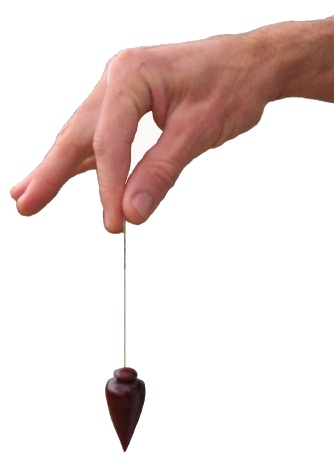Back in the 1950s, psychologist Solomon Asch found that if a group of participants – all but one of whom were plants in the experiment – decided that one straight line was longer than another, when it clearly was not, around 75% of the time the non-plant would defy reason and side with the majority.
I’m fully aware of this experiment as I stand here on Diana’s farm, swinging my rose quartz pendulum, but I’m not going to be the girl who couldn’t feel the vortex dragon. No way.
Today I am practicing the ancient art of geomancy. I’m out on a vast, beautiful property carved out of the countryside by volcanic action 470,000 years ago. Lately it’s been festooned with “power towers” and Blair Witch-style mounds of granite and quartz. The six of us gathered here today are under the guidance of Diana, a striking woman with a wily way with a pendulum.
Geomancy dates back to African-Arabian traders using the Silk Road – who would use markings on the ground and complex charts for divination – but it morphed into different forms in European and Asian cultures. It enjoyed a comeback in 17th century Europe as a Renaissance art, before being stamped out by the Age of Reason – then rearing up again during the rise of interest in the occult in the 19th century.
Seeing talk of “dowsing” on Diana’s flyers, I’d thought we’d just be finding water with forked sticks or – better still – animal shoulder blades, but the method we’re practicing today is more closely aligned to feng shui – in that we’ll be communicating with the spirits of the land, or the “devas”, to use Diana’s Sanskrit term. Diana uses pendulums to eke out energy obstructions and water sources, complementing her love of permaculture. Is your telly playing up due to an abundance of positive ions in the earth? Does your baby refuse to settle in its bedroom thanks to some invisible water source? Diana’s your woman. She’s even been called upon to remove negative spirits from a grungy Melbourne rock pub.
We begin by holding out our pendulums and trying to gauge the outer reaches of each other’s aura. Diana demonstrates on Craig and starts feeling his vibes from a good few metres away. I hope to blazes my aura – which, to be clear, I don’t believe in – isn’t blinking lamely around my body like a dud battery.
Craig pads towards me slowly in his five-toed imitation-leather shoes, one palm held out towards me, the other hand holding his gently rotating pendulum. He stops a couple of metres away and frowns. “My hand’s tingling,” he murmurs. “I can definitely feel your aura here.” I have a go on him and report the same.
Next, we go for a yomp around the land, and Diana bids us tell her where we think the two yin and yang dragon vortexes crisscrossing the property are.
“I can feel it,” one half of an earnest couple from Northcote tells me, mapping out a dragon’s serpentine girth with his hands.
Now, some would say that it’s the ‘ideomotor effect’ that has his pendulum all a-whirl; that is, the subconscious mind minutely influencing his muscles. It’s how Victorian-era mediums convinced the public that tables and ouija board glasses were being moved by spirits. Personally, I’m happy to accept that there are grids of meridian and ley lines of energy running through the Earth – enthusiasts have been building monuments on them since the beginning of time – but I baulk at being asked to hold a conversation with a dragon vortex.
Actually, that’s not true. I do hold a conversation with a dragon vortex, since the peer pressure is immense. These kinds of new age workshops are like a war of attrition against your rational mind. As the hours and explanations wear on, peppered with semi-scientific sounding guff, you feel your boundaries slide sludgily down the mountainside of common sense.
Diana suggests we ask the dragon for permission to cross its path. As this property is inhabited by actual llamas as well as dragons, I ask the vortex if it likes the furry beasts. The pendulum rotates backwards. No.
We conclude by splitting into gender groups, with the women walking anti-clockwise around a sacred stone circle and the men exploring a “labyrinth” off somewhere I can’t spy on. Finally there’s a power tower ceremony, in which we drum up some sacred noise in thanks. I play the singing bowl.
As a mental exercise in connecting with the land, I enjoyed dowsing well enough, but I reckon I’ll leave the gentle art of geomancy to the experts.






